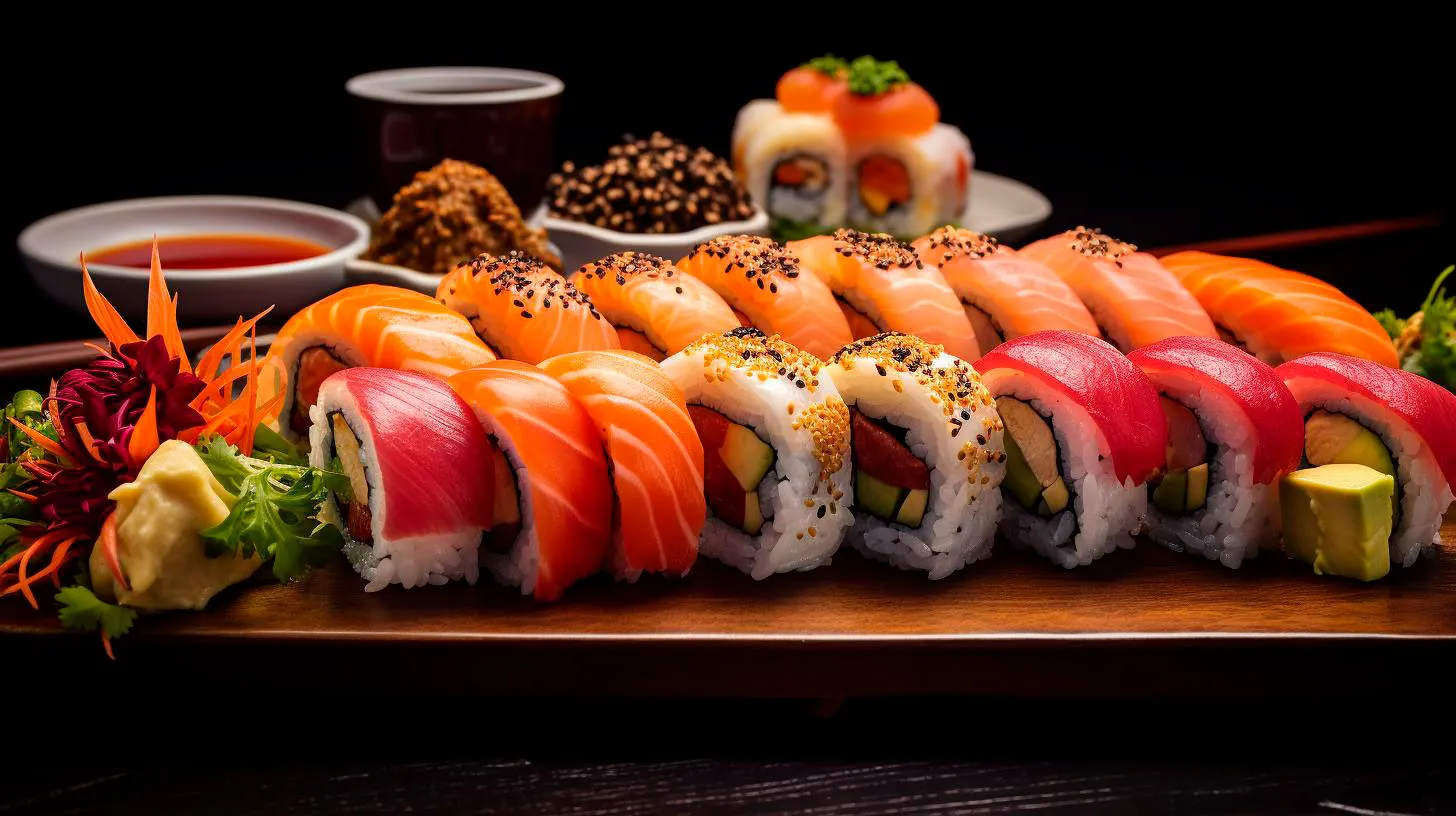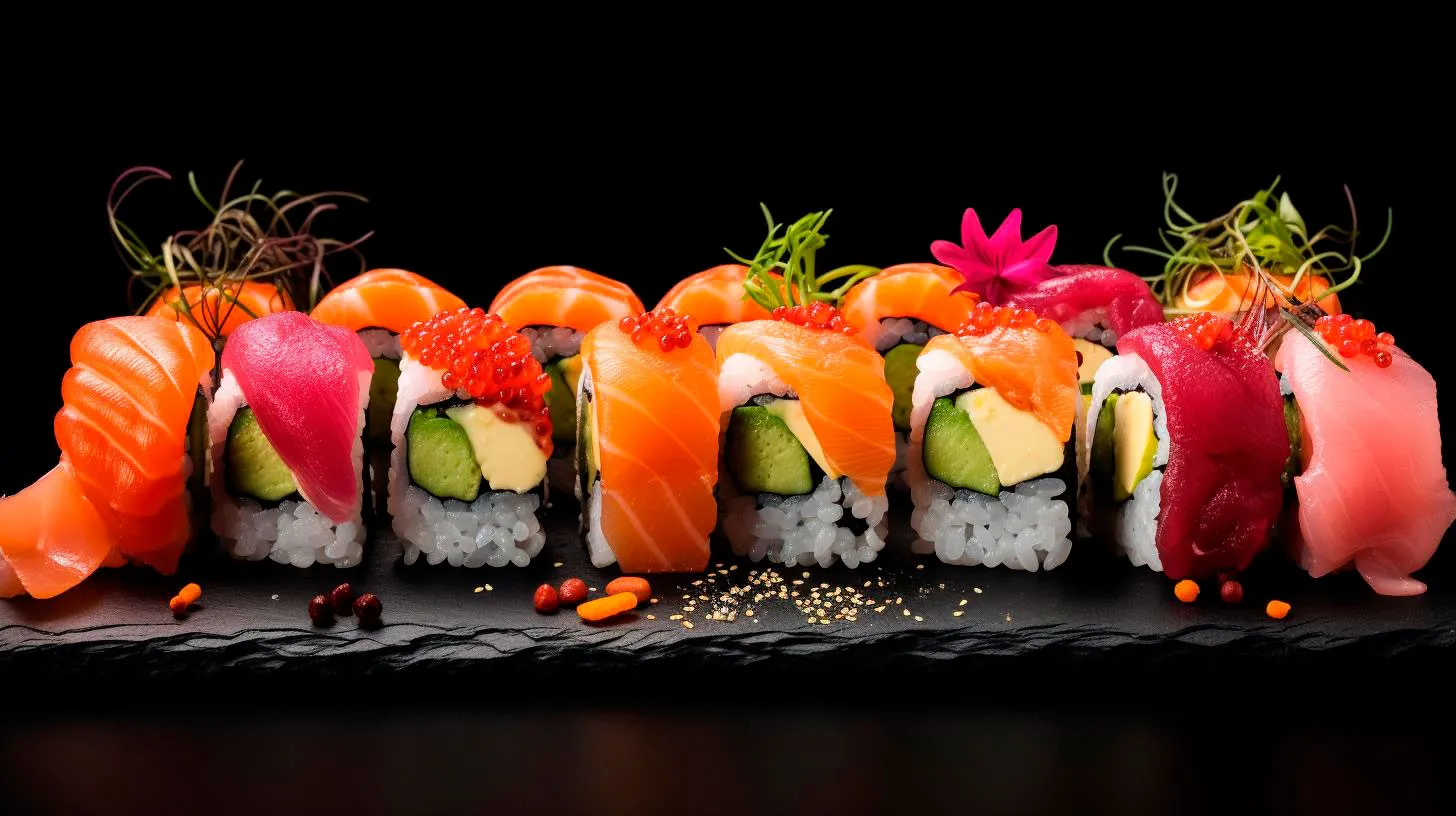Overcoming Challenges: Chefs Reflect on Sushi Journey
However, behind the exquisite presentation and harmonious flavors lie numerous challenges faced by sushi chefs throughout their journey. In this article, we delve into the world of sushi and explore the challenges that chefs must overcome to master this ancient craft.
The Complexity of Sushi
Preparing sushi is far from a simple task. Each morsel of sushi requires meticulous attention to detail, precision, and expertise. From the selection of top-quality ingredients to the artful arrangement on the plate, every aspect of sushi creation must be executed flawlessly. Here are some key challenges that sushi chefs encounter:
- Knife Skills: A sushi chef’s knife skills are paramount. Using a razor-sharp knife, chefs must slice fish with precision, ensuring optimal thickness and consistency.
- Rice Perfection: Crafting the perfect sushi rice is an art in itself. Achieving the ideal balance of stickiness and flavor can take years of practice.
- Fish Selection: Choosing the freshest and highest-quality fish is essential. Sushi chefs must develop an innate understanding of fish varieties, seasonality, and proper handling techniques.
- Menu Innovation: In a fiercely competitive sushi industry, chefs must constantly innovate to stand out. Creating unique flavor combinations and incorporating seasonal ingredients is a never-ending challenge.
- Consistency and Speed: Sushi chefs must maintain consistency in taste, presentation, and quality throughout their service, all while working with speed and efficiency during peak hours.
The Role of Experience and Training
Becoming a sushi chef is not an overnight achievement. It requires relentless dedication, years of training, and passion for the craft. The challenges chefs face also serve as valuable lessons, shaping their culinary skills and expertise. Here are some key takeaways from chefs who have overcome these challenges:
- Experience Matters: Mastery of sushi can only be achieved through hands-on experience. The more time spent behind the sushi counter, the more refined and skilled a chef becomes.
- Continuous Learning: The sushi journey is a never-ending process of learning and self-improvement. Chefs must stay up-to-date with the latest trends, techniques, and ingredients in the industry.
- Attention to Detail: Sushi-making is an intricate art that demands impeccable attention to detail. Chefs must train their senses to recognize the subtleties in taste, texture, and appearance.
- Time Management: Working efficiently and managing time is crucial in a fast-paced sushi environment. Chefs must be able to deliver exceptional quality while meeting high customer demand.
- Passion and Perseverance: Sushi chefs who have overcome the challenges have one common thread: their unwavering passion for the craft combined with the determination to overcome obstacles.
Inspiring Success Stories
While the challenges of the sushi journey can seem daunting, numerous sushi chefs have defied the odds and achieved remarkable success. Their stories serve as inspiration for aspiring chefs worldwide. Here are a couple of notable success stories:
Chef Jiro Ono
Chef Jiro Ono is a legendary figure in the sushi world. Despite facing numerous challenges during his early career, including the devastating effects of World War II, Chef Jiro persevered and became the owner of Sukiyabashi Jiro, a three-Michelin-starred sushi restaurant in Tokyo. His unwavering dedication earned him international recognition as one of the greatest sushi chefs alive.
Chef Nobu Matsuhisa
Chef Nobu Matsuhisa is a prime example of resilience and innovation. Starting from humble beginnings in Japan, he encountered setbacks but eventually triumphed by merging traditional Japanese cuisine with South American flavors. Today, he owns a global empire of Nobu restaurants and is renowned for his unique fusion cuisine.
These success stories demonstrate that with perseverance, passion, and an unwavering commitment to excellence, the challenges faced by sushi chefs can be overcome.
Conclusion
The journey of a sushi chef is one filled with challenges, but these hurdles serve to shape their skills, refine their techniques, and ultimately lead to culinary mastery. The complexities of knife skills, rice preparation, ingredient selection, innovative menu creations, and the need for consistency are all part of the sushi chef’s pursuit of perfection. Through experience, continuous learning, attention to detail, time management, and genuine passion, sushi chefs overcome these obstacles, inspiring others to follow in their footsteps.
So, the next time you savor a piece of beautifully crafted sushi, take a moment to appreciate the dedication, perseverance, and skill that went into making it. Behind every perfect bite lies the sushi chef’s journey of overcoming challenges to create an extraordinary culinary experience.
The Path to Sushi Mastery: Inspirational Backgrounds of Sushi Chefs
In this article, we delve into the inspirational backgrounds of sushi chefs and explore how they become masters in their field.
The Journey Begins: Culinary Training
Before embarking on their journey towards sushi mastery, aspiring sushi chefs undergo rigorous culinary training. Many start their culinary education by attending reputable culinary schools or apprenticeship programs. These training programs aim to impart the fundamental knowledge and skills required for a career in the culinary arts.
Key Takeaways:
- Culinary training forms the foundation of a sushi chef’s career.
- Sushi chefs often attend culinary schools or apprenticeship programs.
- Fundamental skills and knowledge are acquired during training.
However, becoming a sushi chef demands more than just culinary expertise. It requires a deep understanding and appreciation for Japanese culture, tradition, and the art of sushi making.
The Love for Japanese Cuisine
Sushi chefs are drawn to the art form because of their passion for Japanese cuisine. Their love for the delicate flavors, fresh ingredients, and aesthetic appeal of sushi motivates them to hone their skills and strive for perfection.
Many sushi chefs spend time studying Japanese cuisine extensively. They immerse themselves in the rich history, culture, and traditions behind sushi making. This deep-rooted understanding allows them to create sushi that goes beyond taste—it is an artistic expression.
Key Takeaways:
- Passion for Japanese cuisine drives sushi chefs towards mastery.
- Understanding the history, culture, and traditions of sushi is essential.
- Sushi making is a form of artistic expression.
The Mentor-Apprentice Relationship
In the realm of sushi, the mentor-apprentice relationship holds great importance. Aspiring sushi chefs seek out experienced masters who serve as their mentors. This relationship is deeply rooted in trust, respect, and the transfer of knowledge from one generation to the next.
During the apprenticeship, sushi chefs work alongside their mentors, learning the intricacies of sushi making through hands-on experience. They observe every move, from the selection of the finest ingredients to the precision in slicing fish and rolling sushi. This immersive training instills discipline, attention to detail, and a strong work ethic in the apprentices.
Key Takeaways:
- Mentorship plays a crucial role in sushi chef training.
- Hands-on experience is essential for mastering sushi making.
- Discipline, attention to detail, and a strong work ethic are developed through apprenticeship.
Persistence and Perfection
As the saying goes, practice makes perfect. Sushi chefs are no strangers to this philosophy. They spend countless hours honing their skills, repeating techniques until they achieve mastery.
Perfection is not just about the taste of the sushi; it extends to the presentation as well. Sushi chefs aim to create visually stunning dishes that are a feast for the eyes. They meticulously arrange each ingredient, ensuring attention to detail and balance in color, texture, and shape.
Key Takeaways:
- Practice and repetition are essential for sushi chefs.
- Perfection extends to both taste and presentation.
- Attention to detail and balance are paramount.
Embracing Innovation in the Traditional
While sushi is deeply rooted in tradition, sushi chefs understand the importance of innovation in keeping the art form alive and enticing to a modern audience. They experiment with new ingredients, fusion flavors, and techniques to create unique sushi experiences that tantalize the taste buds.
Moreover, sushi chefs stay updated with trends and advancements in the culinary industry. They continuously enhance their skills and explore new ways to push the boundaries of sushi making. This ability to balance tradition and innovation sets them apart as true masters in the field.
Key Takeaways:
- Innovation is crucial for sushi chefs to adapt to evolving tastes.
- Experimentation with new flavors and techniques keeps sushi exciting.
- Continuous learning and skill enhancement are integral parts of sushi mastery.
Conclusion
Behind every delectable sushi dish lies the passion, dedication, and years of training of a sushi chef. Their journey towards mastery encompasses culinary training, a love for Japanese cuisine, mentorship, persistence, and a balance between tradition and innovation. The path to sushi mastery is not an easy one, but it is rooted in an unwavering commitment to the art and a deep appreciation for the culture it represents.
From Beginners to Masters: Lessons Learned in Sushi Making
If you’re a sushi enthusiast looking to elevate your skills in sushi making, this article is your comprehensive guide. Whether you’re a beginner starting from scratch or a seasoned pro, there are valuable lessons to be learned along the way.
The Art of Sushi Making
Sushi making is much more than just rolling rice and seafood together. It requires a deep understanding of the ingredients, techniques, and precision that go into each sushi roll. Here are some key takeaways for every sushi enthusiast:
Avoid rushing your rice preparation
Rice is the foundation of a good sushi roll, and it’s crucial to get it right. Wash the rice thoroughly before cooking to remove excess starch, and ensure proper water-to-rice ratios for optimal texture. Take your time to cook the rice properly, allowing it to steam and cool before using it for sushi.
Invest in quality ingredients
Using fresh, high-quality ingredients is essential to create a memorable sushi experience. Opt for sushi-grade fish, crisp and vibrant vegetables, and premium soy sauce, wasabi, and pickled ginger. Remember, the freshness and quality of your ingredients directly impact the overall taste and presentation of your sushi.
Master the art of rolling
Rolling sushi can be intimidating for beginners, but practice makes perfect. Use a bamboo sushi mat and learn various rolling techniques such as hosomaki (thin roll), uramaki (inside-out roll), and temaki (hand roll). With time and practice, you’ll gain confidence and precision in rolling your sushi.
Advanced Techniques for Sushi Masters
For those seeking to elevate their sushi making skills to a professional level, here are some advanced techniques to incorporate:
Experiment with diverse fillings
While traditional sushi fillings like tuna, salmon, and cucumber are delightful, don’t be afraid to venture into new flavors. Explore unique combinations like tempura shrimp, avocado, cream cheese, or even unconventional fillings like fruits or foie gras. The possibilities are endless!
Perfect your knife skills
A skilled sushi chef understands the importance of knife skills in creating beautiful and precise cuts. Invest in a high-quality sushi knife and practice proper techniques such as the slice (sashimi), the roll (maki), and the cube (oshi). This mastery of knife skills will significantly enhance the presentation and texture of your sushi.
Present sushi with artistic flair
Sushi is not only about taste but also visual appeal. Take presentation to the next level by incorporating artistic elements in your sushi plating. Experiment with garnishes, arranging sushi rolls in a visually pleasing manner, and mastering the art of shaping nigiri and sashimi. The beauty of your presentation will elevate the overall dining experience.
The Delicious Rewards
As you progress from a beginner to a sushi master, the rewards are abundant. Here are some key benefits and takeaways you’ll gain:
- Enhanced culinary skills and knowledge of Japanese cuisine
- The ability to create personalized and unique sushi combinations
- A deeper appreciation for the artistry and precision of sushi making
- The satisfaction of impressing family and friends with your sushi creations
- The potential to explore career opportunities in the culinary industry
According to a survey conducted by the Japan External Trade Organization, sushi consumption has been steadily increasing worldwide, with an estimated annual growth rate of 6.1%. This growing popularity reinforces the value of acquiring sushi making skills.
So, whether you’re a hobbyist or aspiring sushi chef, embarking on the journey of sushi making is both rewarding and fulfilling. Embrace the learning process, immerse yourself in the art, and let your creativity shine. Remember, from beginners to masters, sushi making is a lifelong pursuit of perfection.
Sushi Success Stories: Chefs’ Humble Beginnings
Passion for Perfection
Successful sushi chefs share a common trait: an unwavering passion for perfection. They approach their craft with utmost dedication and continuously strive to improve their skills. This obsession with perfection is what sets them apart from others in the industry.
Bullet Points:
- Constant pursuit of perfection
- Never-ending skill improvement
- Dedication to their craft
“Sushi-making is an art that takes years to master,” says Chef Hiroshi, a renowned sushi chef in Tokyo. “It requires patience, precision, and a deep understanding of the ingredients.” The commitment to achieving perfection is what drives these sushi chefs forward, even in the face of challenges.
The Humble Beginnings
Behind the polished sushi bars of esteemed restaurants, there are stories of chefs who started with humble beginnings. Many of them began their careers as dishwashers, kitchen assistants, or even delivery boys. However, their determination and love for sushi pushed them to pursue their dreams and climb the ladder of success.
Take Chef Kenji, for example. Starting as a dishwasher at a small sushi joint, he observed the chefs carefully crafting each piece of sushi. Fascinated by their artistry, he decided to learn the craft himself. After years of perseverance and hard work, Chef Kenji now runs his own acclaimed sushi restaurant, delighting customers with his exquisite creations.
Bullet Points:
- Started from the bottom
- Persistent pursuit of their dreams
- Inspiration from seasoned chefs
These stories of humble beginnings are not uncommon in the sushi world. Sushi chefs often apprentice under experienced masters, absorbing their knowledge and honing their skills. This mentorship provides aspiring sushi chefs with a solid foundation and the chance to learn the intricacies of the craft.
Key Takeaways: The Journey to Success
The path to becoming a successful sushi chef is not easy, but it is undoubtedly rewarding. Here are some key takeaways from sushi chefs’ success stories:
1. Passion is the fuel:
- Passion drives sushi chefs to strive for perfection.
- It fuels their commitment to continuous improvement.
- Passion keeps them dedicated to their craft, even during challenging times.
2. Hard work pays off:
- Starting from humble beginnings does not hinder success.
- The sushi industry values dedication and hard work.
- Perseverance opens doors to success.
3. Learn from experienced mentors:
- Apprenticeships under experienced sushi masters provide invaluable knowledge.
- Mentorship helps develop skills and technique.
- Learning from the best paves the way for greatness.
In conclusion, sushi success stories share a common narrative of passion, persistence, and hard work. Sushi chefs start from the bottom, often learning their craft as dishwashers or kitchen assistants. Through years of dedication, they become masters of their trade, delighting patrons with the delicate flavors and artistry of sushi. Their journeys inspire aspiring chefs to embrace their dreams and strive for excellence in the competitive world of sushi.


